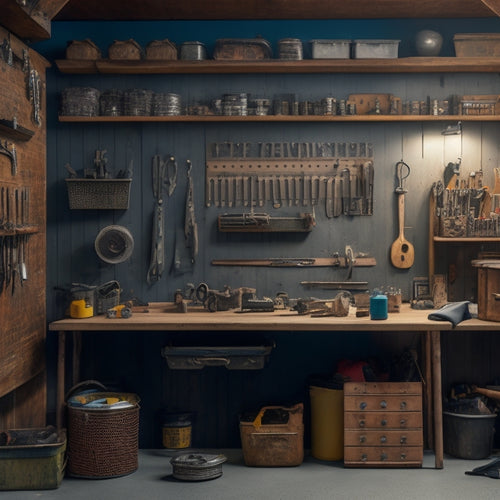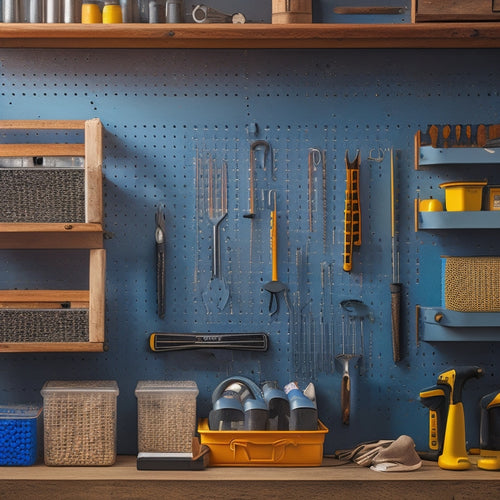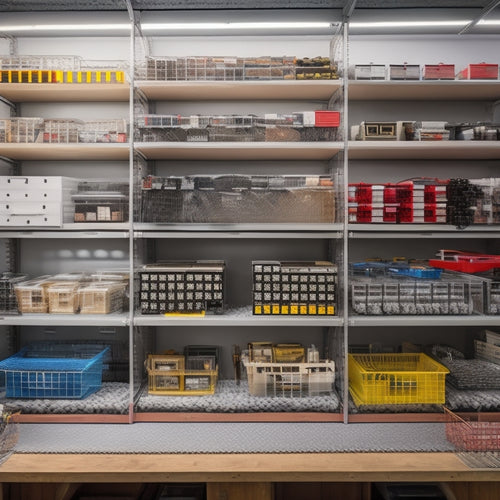
Best Tool Boxes for the Serious DIYer Garage
Share
When it comes to serious DIY projects, a high-quality tool box is essential for efficiency and effectiveness. You need a box that can store your tools safely, provide easy access, and withstand frequent use. Consider the tool box size and portability, as well as the storage capacity, durability, and build quality. Features like adjustable dividers, removable trays, and rust-resistant coatings are must-haves. Top brands like DeWalt, Milwaukee, and Stanley offer premium options, but budget-friendly alternatives are also available. By evaluating your needs and priorities, you'll find the perfect tool box to enhance your DIY game - and that's just the starting point for optimizing your garage workflow.
Key Takeaways
- A high-quality tool box with adjustable dividers and removable trays enables customized storage and efficient organization for serious DIYers.
- Consider tool box size, storage capacity, durability, and portability when selecting the best option for your garage or workshop.
- Premium tool boxes from top brands like DeWalt, Milwaukee, and Stanley offer advanced features, high-quality materials, and enhanced security.
- Customization and personalization options, such as modular designs and adjustable inserts, help tailor storage solutions to specific tool sets and needs.
- Evaluating essential features, reading user reviews, and assessing brand reputation are crucial for making an informed decision when choosing the best tool box.
Top Picks for DIY Enthusiasts
When it comes to DIY projects, having the right tool box can make all the difference in efficiency and effectiveness. You're not just looking for a container to store your tools, but a system that helps you stay organized and focused on the task at hand.
As a serious DIYer, you need a tool box that can keep up with your ambitious project ideas. Consider a tool box with adjustable dividers and removable trays to customize your storage space. This will allow you to quickly find the tool you need, reducing downtime and increasing productivity.
Additionally, look for a tool box with a rust-resistant coating and durable construction to withstand the rigors of your projects. Regular tool maintenance is also essential to guarantee your tools remain in top condition.
Set aside time each week to clean and lubricate your tools, and store them in a dry place to prevent corrosion. By investing in a high-quality tool box and following these tool maintenance tips, you'll be well on your way to tackling even the most complex DIY project ideas with confidence.
Essential Features to Consider
When selecting a tool box, you'll want to reflect on three critical factors that'll impact your workflow and overall satisfaction.
You need to contemplate the tool box size options that'll fit your available storage space and the type of projects you work on.
Additionally, you should evaluate the tool storage capacity and the durability and build quality of the tool box to guarantee it can withstand the rigors of frequent use.
Tool Box Size Options
You'll find tool boxes in a range of sizes, from compact chests that fit in small spaces to large, wheeled cabinets that can hold hundreds of pounds of equipment.
When choosing the right tool box size, consider the space you have available in your garage or workshop. Compact tool boxes are ideal for small areas, such as under a workbench or in a corner. They're perfect for storing essential hand tools and keeping them organized.
On the other hand, large tool boxes provide ample storage for power tools, accessories, and bulky equipment. They often feature wheels or casters, making them easy to move around your workspace.
As you evaluate tool box size options, think about your specific needs and the types of projects you typically work on. If you're a DIYer who focuses on small tasks and repairs, a compact tool box might be sufficient.
However, if you're a serious DIYer who tackles larger, more complex projects, a large tool box is likely a better fit. Remember to prioritize accessibility and mobility when selecting a tool box, ensuring you can easily retrieve the tools you need while maintaining a safe and organized workspace.
Tool Storage Capacity
Most DIYers require a tool box that can store a substantial number of tools and accessories, making tool storage capacity a critical consideration. You need a tool box that can efficiently store your tools, ensuring they're organized, protected, and easily accessible.
When evaluating tool storage capacity, consider the number and type of tools you plan to store. Think about the size and shape of your tools, as well as the frequency of use.
Look for tool boxes with clever space optimization features, such as adjustable dividers, removable trays, and multi-tiered storage compartments. These features enable you to customize the storage space to fit your specific needs, maximizing storage capacity while minimizing clutter.
Additionally, consider tool storage solutions that incorporate small parts organizers, such as drawers or bins, to keep tiny components like screws, nuts, and bolts tidy and within reach.
Durability and Build Quality
How long do you expect your tool box to last, taking into account the rough handling and harsh environments it may be subjected to?
Durability and build quality are essential factors to take into account when selecting the right tool box for your DIY needs. A well-built tool box can withstand the rigors of daily use, protecting your important tools from damage and guaranteeing your safety.
When evaluating a tool box's durability, look for strong material selection and construction techniques. A sturdy, rust-resistant metal frame and reinforced corners can absorb impacts and prevent collapse.
Weather-resistant coatings and seals can protect the contents from moisture and extreme temperatures. Additionally, a tool box with a secure latch and hinges can prevent accidental openings and closures.
A high-quality tool box is built to last, providing a safe and reliable storage solution for your tools. By prioritizing durability and build quality, you can guarantee your tool box remains a trusted companion in your DIY efforts, even in the most demanding environments.
Best Tool Box Brands
When selecting a tool box, you'll want to take into account the top brands that offer high-quality products.
You'll need to compare brands like DeWalt, Milwaukee, and Stanley to determine which one best fits your needs.
To guarantee you're getting a reliable tool box, you should also conduct quality checks, such as examining the materials, construction, and warranty offered.
Top Brands Compared
You've got a wealth of tool box brands vying for your attention, each promising to be the ultimate storage solution for your DIY arsenal. But which ones deliver on their promises? To help you make an informed decision, let's compare the top brands in the market.
DeWalt, Milwaukee, and Bosch are household names in the DIY community, and for good reason. They boast an impressive brand reputation, backed by years of producing high-quality tools and storage solutions. User reviews consistently praise their tool boxes for durability, organization, and ease of use.
DeWalt's TSTAK series, for instance, is a favorite among contractors and serious DIYers, offering a versatile and customizable storage system.
Other notable brands, such as Craftsman and Stanley, also offer reliable tool boxes that cater to different needs and budgets. Craftsman's 26-inch tool box, for example, provides ample storage space and features a sturdy design.
When choosing a brand, consider your specific requirements, budget, and the type of projects you typically work on. By assessing your options carefully, you'll find the perfect tool box to keep your DIY arsenal organized and within reach.
Tool Box Quality Checks
Selecting an excellent tool box requires a thorough examination of its quality, and that's where rigorous quality checks come in. You want to guarantee your tool box can withstand the demands of your DIY projects and provide a safe storage environment for your prized tools.
When evaluating tool box quality, consider the following key factors:
| Quality Check | Description | Why It Matters |
|---|---|---|
| Tool Material | Durable materials like steel or aluminum guarantee the tool box can withstand heavy tools and harsh environments. | A sturdy tool box protects your tools from damage and guarantees your safety while working. |
| Locking Mechanisms | Reliable locking systems prevent unauthorized access and protect your tools from theft. | Secure locking mechanisms safeguard your prized tools and prevent accidents caused by misplaced tools. |
| Build Quality | A well-constructed tool box with smooth edges and secure compartments prevents tools from getting damaged or causing injuries. | A well-built tool box guarantees your tools are organized, easily accessible, and safe to handle. |
Toolbox Size and Portability
A well-stocked toolbox is only as good as its ability to keep up with you on the job site or in the workshop. As a serious DIYer, you need a toolbox that's not only durable but also portable and compact. You can't afford to be weighed down by a bulky box that hinders your mobility.
That's why you should look for portable solutions that allow you to move freely around your workspace.
When it comes to toolbox size, consider the type of projects you typically work on and the tools you need to carry. If you're working on smaller projects, a compact design with a smaller footprint might be ideal.
However, if you're working on larger projects that require more tools, you may need a larger toolbox with more storage capacity.
Ultimately, the key is to find a toolbox that strikes a balance between portability and storage capacity. You want a box that's easy to carry around but still has enough space to hold all your essential tools.
Organizational Systems and Compartments
Organize your tools with precision using a toolbox that incorporates thoughtful organizational systems and compartments. A well-designed toolbox should have customizable compartment configurations that cater to your specific toolset, keeping frequently used items within easy reach. This not only saves time but also reduces the risk of accidents caused by cluttered workspaces.
When selecting a toolbox, look for organizational accessories that enhance its functionality. Some essential features to take into account are:
- Adjustable dividers and shelves to accommodate tools of varying sizes
- Small parts trays and compartments for storing nuts, bolts, and screws
- Tool holders and clips for securing items like pliers, wrenches, and screwdrivers
- A removable tray or organizer for easy cleaning and maintenance
Durability and Build Quality
Your toolbox's organizational systems and compartments are only as good as the durability and build quality of the box itself. A toolbox that can withstand the rigors of daily use is essential for a serious DIYer like you.
When evaluating durability, look for toolboxes made from high-quality materials, such as heavy-gauge steel or long-lasting polymers. The material selection should prioritize strength, corrosion resistance, and impact resistance.
Construction techniques also play a significant role in determining the toolbox's build quality. Look for toolboxes with sturdy welding, strong hinges, and secure latches. The box's overall structure should be able to support the weight of your tools and withstand regular opening and closing.
A well-built toolbox will protect your precious tools from damage and guarantee your safety while working. Additionally, a durable toolbox will reduce the risk of accidental falls or collapses, preventing injuries and property damage.
Budget-Friendly Options
Toolboxes don't have to break the bank to be effective and reliable. As a DIYer, you can find budget-friendly options that meet your needs without compromising on quality.
Look for toolboxes made from affordable materials that still offer durability and protection for your tools. Compact designs are also a great way to save space and money.
Some budget-friendly options to contemplate:
- Waterloo's 5-Drawer Tool Chest, which offers ample storage at an affordable price
- Stanley's FatMax 22" Tool Box, featuring a compact design and rugged construction
- DeWalt's TSTAK Toolbox, designed for versatility and ease of use
- Husky's 26" Tool Chest, providing ample storage and organization for your tools
When shopping for a budget-friendly toolbox, prioritize your needs and focus on the features that matter most to you.
With a little research, you can find a reliable and effective toolbox that fits your budget. Remember, safety should always be your top priority, so make sure your chosen toolbox meets your safety standards.
Premium Tool Boxes for Pros
As you step up your DIY game, you may find that budget-friendly options no longer meet your growing needs. You require tool boxes that can keep up with your increased demands for quality, durability, and organization. That's where premium tool boxes for pros come in. These high-end tool boxes are designed with the serious DIYer in mind, featuring premium materials and ergonomic designs that prioritize comfort, safety, and efficiency.
| Tool Box | Material | Weight Capacity |
|---|---|---|
| DeWalt TSTAK | High-impact polymer | 250 lbs |
| Milwaukee Packout | Durable steel | 300 lbs |
| Bosch L-Boxx | Sturdy ABS plastic | 200 lbs |
| Snap-on EPIQ | Industrial-grade steel | 400 lbs |
When investing in a premium tool box, you can expect advanced features like reinforced frames, rust-resistant coatings, and intelligent storage solutions. These tool boxes are built to withstand the rigors of heavy use, ensuring your tools remain protected and organized. By choosing a premium tool box, you're investing in your safety and the success of your DIY projects.
Customization and Personalization
A well-organized workspace is essential for any serious DIYer, and premium tool boxes offer the flexibility to tailor your storage solution to your unique needs.
As you invest in a high-quality tool box, you'll appreciate the ability to customize and personalize your workspace to fit your DIY aesthetics. This means you can optimize your tool box to accommodate your most frequently used tools, keeping them within easy reach to enhance efficiency and productivity.
Some premium tool boxes offer:
- Adjustable dividers and compartments to accommodate tools of varying sizes
- Customizable inserts and trays to keep small parts and accessories organized
- Magnetic strips and hooks to hang frequently used tools and accessories
- Modular designs that allow you to add or remove sections as your needs change
With a personalized organization system, you'll reduce clutter, minimize downtime, and create a workspace that reflects your unique DIY style.
Tool Box Security Features
Your prized toolkit is a significant investment, and its security is essential to prevent theft, loss, or damage. When selecting a tool box, you must consider the security features that will protect your treasured tools.
Look for tool boxes with sturdy lock mechanisms that can withstand forced entry and tampering. Some tool boxes come with combination locks, while others have keyless entry systems or traditional keyed locks. Confirm the lock mechanism is made from high-quality, durable materials that can resist corrosion and wear.
The security materials used in the tool box's construction are also vital. Opt for tool boxes made from heavy-gauge steel or durable polymers that can withstand physical stress.
Additionally, consider tool boxes with reinforced doors, lids, and hinges to prevent prying or bending. Some tool boxes may also feature anti-theft features, such as anchor points for chaining or padlocking.
Frequently Asked Questions
Can I Customize My Tool Box With My Name or Logo?
You can definitely customize your tool box with your name or logo, taking advantage of personalization options that offer branding benefits, allowing you to uniquely identify your gear and enhance your professional image.
Are Tool Boxes Compatible With Cordless Tool Batteries?
When you're selecting a tool box, you'll want to guarantee it's compatible with your cordless tool batteries; look for boxes with dedicated battery storage compartments that keep them organized, protected, and easily accessible for best tool organization and safety.
Do Tool Boxes Come With Pre-Drilled Holes for Wall Mounting?
Like a perfectly fitting puzzle piece, you'll find that many tool boxes come with pre-drilled holes for wall mounting, offering you a range of mounting options and ensuring wall stability, so you can securely store your tools and focus on the task at hand.
Can I Use a Tool Box as a Workbench or Vice?
When considering a tool box as a workbench or vice, you'll need to assess its dimensions and weight capacity to guarantee stability and safety; investigate workbench alternatives that provide better support and ergonomic design for your specific DIY needs.
Are Tool Boxes Waterproof or Water-Resistant?
You'll find that most tool boxes offer some level of water resistance, but only a few are fully waterproof; look for durability features like sealed lids and rust-resistant coatings, and follow maintenance tips like regular cleaning and drying to make certain your tools stay protected.
Conclusion
As you step into your garage, your tool box beckons like a trusted ally, ready to release a world of possibility. With the right combination of features, size, and organization, it's more than just a container – it's a command center for your DIY domination. Invest in the best, and you'll be revealing a domain of precision, efficiency, and satisfaction in every project that follows.
Related Posts
-

Design Considerations for a Custom Pegboard
When designing a custom pegboard, you'll want to start by evaluating your storage needs, considering factors like too...
-

What to Look for in a Pegboard Tool Storage Kit
When shopping for a pegboard tool storage kit, you need a system that combines customized organization, sturdy durabi...
-

10 Essential Steps for Small Parts Bin Storage
To optimize your small parts bin storage, start by defining your storage needs and goals, considering factors like av...


